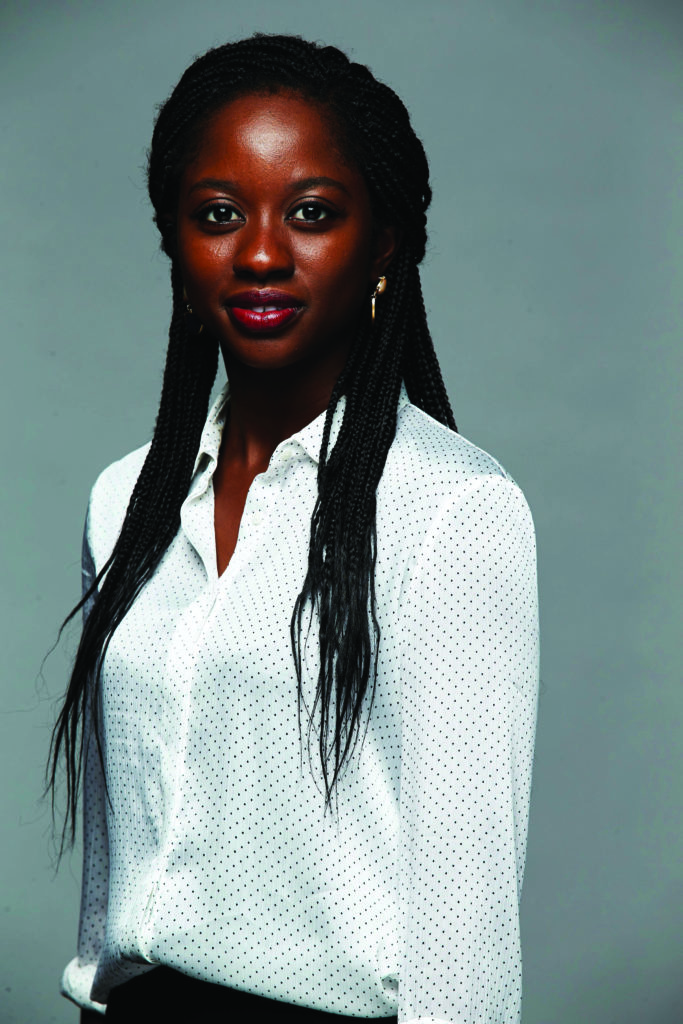Changemaker: Combining Engineering and Medicine
Changemaker: Combining Engineering and Medicine
The lives of family members inspire an engineer to improve health care in Africa.

Mercy Asiedu ’14
Mercy Asiedu ’14 knows all too well the staggering human toll that results from the lack of basic health care in developing countries.
“Diagnostic and preventative medicine is really lacking,” says Asiedu, whose own family members in Ghana have paid the price. “People die and we don’t even know why.”
One of her aunts died, apparently of pancreatic cancer, because her illness went undiagnosed. Another aunt died when nobody noticed she was aspirating while in childbirth. A grandmother succumbed to diabetes because of the lack of proper monitoring and shortages of medications.
“That’s what inspired me to go into medical devices and diagnostics,” says Asiedu, a postdoctoral research scientist at MIT, whose efforts to address health care problems in sub-Sahara Africa earned her an inaugural Patrick J. McGovern Tech for Humanity Changemakers award from the Computer History Museum earlier this year.
The award will support two start-up companies Asiedu has launched. Both use advances in machine learning to provide preventative and diagnostic health care to chronic disease victims in sub-Sahara Africa.
One of the companies, Calla Health, is about to market an FDA–cleared, low-cost, portable cervical cancer screening device, the Pocket Colposcope, for use by midwives or community health workers. Asiedu developed AI-based algorithms for the device as part of her PhD research to enable automated risk assessment. Asiedu is also leading efforts to develop and commercialize a version of the cervical cancer screening device that women can use to screen themselves.
The other company, GAPhealth, cofounded with Bintou Kaira, a chemical engineer from Gambia, is developing a data-driven, personalized mobile app designed to make it easier for patients with noncommunicable diseases to monitor their symptoms and connect by telehealth with doctors when they need help. The mobile app, inspired by both cofounders watching their mothers struggle with diabetes, is set to be piloted in Ghana and Gambia this year.
Asiedu was born and raised in a small village near Kumasi, one of Ghana’s largest cities, where her father, an agricultural research scientist, and her mother, a former IT specialist, were employed.
In junior high school, Asiedu aspired to be a fashion designer. However, at her mother’s urging, she pursued a science track in high school because of the better career opportunities it offered. “I found that I really enjoyed it,” Asiedu says.
She initially planned to stay in Ghana to attend medical school. The Zawadi Africa Education Fund scholarship, however, gave Asiedu an opportunity to apply to select undergraduate programs in the United States. The biomedical engineering program at Rochester caught her eye because of its high ranking and because of the support of all-tuition-paid Renaissance and Global Merit scholarships that the University offered. Despite her uncertainties about studying in the US, she followed her mother’s advice and accepted.
Asiedu found an academic home in the Department of Biomedical Engineering. She soon switched her focus from medical school to biomedical engineering, with a focus in biomechanics and medical devices.
“I really enjoyed the artistic combination with science and medicine. You have to be imaginative when creating solutions,” she says.
Amy Lerner, an associate professor of biomedical engineering, “was one of the most amazing mentors I have had—just very thoughtful and approachable with how she worked with her students, which is something I really appreciated as an undergraduate and even more so now.” Asiedu says.
Drawing on the lessons she learned from her coursework in biomechanics and her senior design project at Rochester, Asiedu began developing the cervical cancer self-screening device as part of her PhD research at Duke University. She worked from concept through prototyping and had opportunities to conduct clinical trials in Peru and Ghana. She is pursuing her postdoc at MIT to further understand how new machine-learning techniques can be applied to large medical data sets, which will help her companies.
Asiedu is currently taking a six-month maternity leave from her postdoc. Her baby boy is the first child for Asiedu and her husband, Jonah, a former research scientist at Duke, who also now works for a start-up company.
As a woman and person of color, Asiedu is doubly representative of large segments of the population who remain underrepresented in STEM fields.
At Duke, she was founder and president of the African Graduate and Professional Students Association, which created mentorship programs for minority and African undergraduates. She also gives talks to high school students about her experiences, encouraging women and minorities in particular to consider science and engineering.
Her advice: “Dedicate time to studying what you are passionate about but also be kind to yourself. When you are in fields like biomedical engineering or pursuing a PhD, and you find it really challenging, you are tempted to think, because you are a minority, that you are the only person going through those challenges. But you should realize that most people in those programs find them challenging. You just have to make it through by keeping the end goal in mind. Having a support group and community that can encourage you to keep going when the going gets tough is especially important.”
— Bob Marcotte, October 2021
This article originally appeared in the fall 2021 issue of Rochester Review magazine


